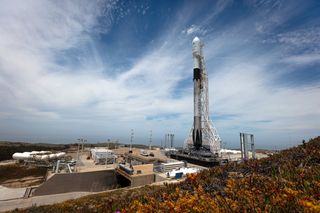Update for 10:45 am ET: SpaceX has succesfully launched three Radarsat satellites into orbit and landed its Falcon 9 booster. The mission is in a coast phase before satellite deployment. Read our full story here.
SpaceX will launch three next-generation Earth-observing satellites for the Canadian Space Agency Wednesday (June 12), and you can watch the liftoff live.
A two-stage Falcon 9 rocket with a preflown first stage is scheduled to launch the three-spacecraft Radarsat Constellation Mission (RCM) tomorrow from Vandenberg Air Force Base in California. The 13-minute launch window opens at 10:17 a.m. EDT (1417 GMT; 7:17 a.m. local California time).
You can watch the liftoff live here at Space.com, courtesy of SpaceX, or directly via the spaceflight company. And there will be a landing attempt as well: About 8 minutes after liftoff, the first stage will come back down at Vandenberg's Landing Zone 4.
This booster already has one launch and landing under its belt. It helped send SpaceX's Crew Dragon capsule toward the International Space Station this past March. That uncrewed, six-day flight, known as Demo-1, was the first-ever space mission for the astronaut taxi.
The RCM satellites represent the next stage of Canada's Radarsat program, which eyes our planet in radio-wavelength light. Two Radarsat satellites have made it to Earth orbit to date. Radarsat-1 operated from 1995 through 2013, and Radarsat-2 launched in December 2007 and is still going strong.
"Built by MDA, a Maxar company, the three-satellite configuration of the RCM will provide daily revisits of Canada's vast territory and maritime approaches, including the Arctic up to 4 times a day, as well as daily access to any point of 90% of the world's surface," SpaceX representatives wrote in a mission description.
Get the Space.com Newsletter
Breaking space news, the latest updates on rocket launches, skywatching events and more!

"The RCM will support the Government of Canada in delivering responsive and cost-effective services to meet Canadian needs in areas like maritime surveillance, ecosystem and climate change monitoring and helping disaster relief efforts," they added.
The RCM satellites will settle into an orbit about 370 miles (600 kilometers) above our planet, Canadian Space Agency officials have said.
- SpaceX's Crew Dragon Demo-1 Test Flight in Pictures
- See the Evolution of SpaceX's Rockets in Pictures
- Satellite Quiz: How Well Do You Know What's Orbiting Earth?
Mike Wall's book about the search for alien life, "Out There" (Grand Central Publishing, 2018; illustrated by Karl Tate), is out now. Follow him on Twitter @michaeldwall. Follow us on Twitter @Spacedotcom or Facebook.
Join our Space Forums to keep talking space on the latest missions, night sky and more! And if you have a news tip, correction or comment, let us know at: community@space.com.

Michael Wall is a Senior Space Writer with Space.com and joined the team in 2010. He primarily covers exoplanets, spaceflight and military space, but has been known to dabble in the space art beat. His book about the search for alien life, "Out There," was published on Nov. 13, 2018. Before becoming a science writer, Michael worked as a herpetologist and wildlife biologist. He has a Ph.D. in evolutionary biology from the University of Sydney, Australia, a bachelor's degree from the University of Arizona, and a graduate certificate in science writing from the University of California, Santa Cruz. To find out what his latest project is, you can follow Michael on Twitter.
Most Popular


